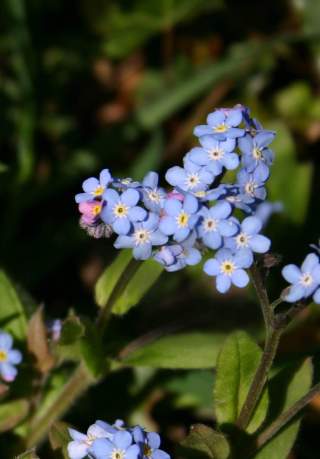Today, I took my 9-year-old son to his football match. It’s normally Dad who does the football matches, but it had been almost a year since I’d seen my son play due to having the new baby and he asked if I’d go and watch him. He’s been appreciating some one-to-one time with me of late, which of course I love too.
While he was warming up, I automatically joined the other waiting parents by scrolling on my phone, but as I’m trying to be more active I realized I could use this as an opportunity to go for a walk, get my own blood circulating a bit. I wasn’t in an area I knew very well so I just walked out down the road and after about ten minutes I came across a small church.
I thought it would be good to have a little look around. There was a small graveyard just in front of the church, hidden by tall hedges. The graves looked old and weather-beaten, and I’m sure it had long since closed to new burials.
I first noticed five cross-shaped gravestones, lying flat in a line on the ground. On them were the details of men – figures in the community as their job titles were also engraved under their names, each from the 1800s, early 1900s.
The book of Ecclesiastes came to mind. (I’ve been reading over it this month.) In it, Solomon – the king – writes about accomplishments and the work we do, the things we put our effort into, the dreams we chase, and reflects how all of it is pointless once we’re dead. Not in the immediate years following our death, but the hundreds of years that see us but a distant memory, if that.
There can be great meaning to what we do, if through doing it we help others, but equally we spend a great deal of time doing or worrying about things that have no meaning.
Then I took a good look at everything I’d done, looked at all the sweat and hard work. But when I looked, I saw nothing but smoke. Smoke and spitting into the wind. There was nothing to any of it. Nothing. (Ecclesiastes 2:11)
I thought of these men in the ground. Long gone. They probably were highly regarded in their day around the area, but who remembers them, or what they did today?
I then saw a small, quite beautiful, cherub angel gravestone. It was to mark the grave of a baby. I couldn’t tell how old the baby was as the dates had worn away. A little baby without its mother, a mother without her child. I thought of the mother having to put her newborn child into the ground here, the tears that must have been shed, nearly 100 years ago. Yet so many more have been born since – life has moved on at an extraordinary rate but this baby was here once, briefly. This baby’s short life mattered.

I saw other graves. Some in fairly good condition, others nothing more than a nub of stone sticking out of the ground. No matter what condition the stone, what the status was of the person buried there, or what age or situation they died, they were united by sharing this space. They had once breathed and created memories, but they all ended up as dust and mud, under a gravestone, forgotten or barely remembered.

I was struck by this stone of a weeping angel.

It was of two sisters, buried together. One had passed away at age 19, the other had died later age 35. I thought of the parents having to cope with two of their children dying, having perhaps adjusted to the loss of one daughter, only to lose another. Or perhaps they had died too? Who knows the story behind this family’s plot. Who even cares?
There was a striking stone marking the grave of a toddler. Clearly the child of someone of some wealth or importance at the time to afford such a memorial.

Of course, 100 years ago infant mortality was high so child burials would have been common, but the diversity of the graves in this one tiny patch of churchyard just seemed so poignant to me. Those who lived long, buried next to those who never grew up.
Each one would have been mourned, by wives, husbands, mothers, fathers, friends and relatives… who now themselves may have departed. How did they live out their lives – happy, depressed, lonely, content…? How did grief shape their futures?
In Ecclesiastes, Solomon sees that bad things happen to good people, good things happen to bad people, the wise know more and die, just like fools who don’t know anything and die too. Life is for living he concludes, we shouldn’t take ourselves too seriously, we can chase any number of dreams but without God there isn’t much point to life at all.
As I headed back to watch my son’s football match, I considered today, this next hour, my ‘work’ was to be there for him. To see him smile at having Mum watching from the sidelines. This memory would stay between us two. And when I’m dead and gone, and he’s dead and gone, this moment will be forever gone too.
But, today, it mattered.











